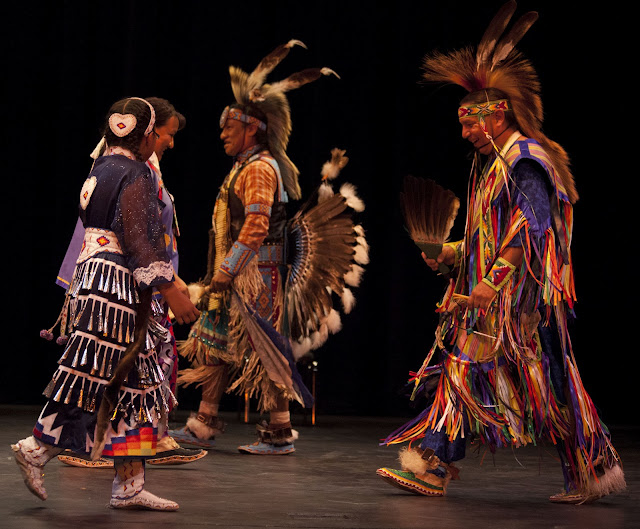Meskwaki dancers
with eagle feathers, jingle cones,
rattles, ribbons, fur,
porcupine quills, stone pipes, beaded
moccasins beat to the drum
The Brown Otter Song and Dance Group from the Meskwaki Settlement community near Tama, Iowa, performing the Friendship Dance at the Sondheim Center in Fairfield, Iowa. They are wearing traditional costumes decorated with bead work, ribbons and feathers.
The Meskwaki, the Red Earth People, are one of the Algonquin-speaking tribes that originated in the Eastern woodlands around the St. Lawrence Seaway and the Great Lakes. In the 1600s they were pushed west into what is now Michigan and Wisconsin by the Iroquois. After battling the French they moved to the Mississippi River region. By 1848 all of the tribes west of the Mississippi had been removed by the United States government to reservations further west, except the Meskwaki. In 1856 the newly-formed state of Iowa ("this is the place") gave them permission to stay as long as they lived in peace, purchased land using only friendly means and not by seeking government help, pay taxes on purchased land and obey all state laws. In 1857 the Meskwaki purchased the first eighty acres along the Iowa River, where the present Pow Wow grounds are located. Today the Meskwaki Settlement includes more than 8,000 acres.
Harlan Brown sings a traditional dance song while beating his drum.
Eagle Dancer, wearing an eagle feather bustle and headdress and carrying a gourd rattle and redstone peace pipe, bends low during the Pipe Dance.
Grass Dancer's ribbons and beaded bands swirl as he dances the Grass Dance with eagle feather fan and hoop.
Men and women face each other during the Harvest Dance, then trade sides back and forth as they "walk the rows," harvesting corn, beans and squash.
The men show off their footwork during the Victory/Veteran's Dance. Many Meskwaki and other Native American tribes proudly served in the U.S. Armed Forces and during World War II eight Meskwaki soldiers served as code-talkers.








No comments:
Post a Comment